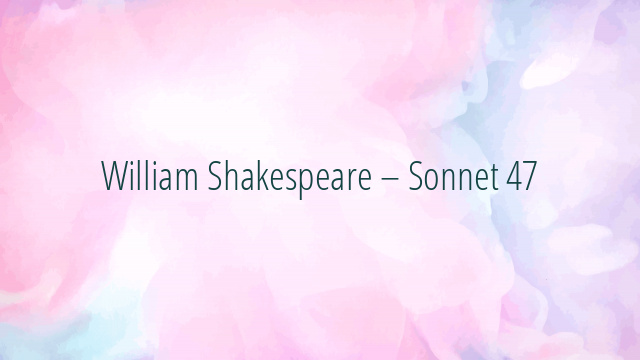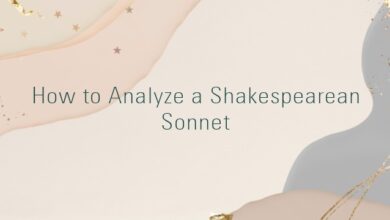
William Shakespeare – Sonnet 47
Betwixt mine eye and heart a league is took,
And each doth good turns now unto the other:
When that mine eye is famish’d for a look,
Or heart in love with sighs himself doth smother,
With my love’s picture then my eye doth feast,
And to the painted banquet bids my heart;
Another time mine eye is my heart’s guest,
And in his thoughts of love doth share a part:
So, either by thy picture or my love,
Thy self away, art present still with me;
For thou not farther than my thoughts canst move,
And I am still with them, and they with thee;
Or, if they sleep, thy picture in my sight
Awakes my heart, to heart’s and eyes’ delight.
The contest between heart and eyes is settled, and they now live in amity, in fact doing good turns to one another. This is still however a sonnet of absence, (see line 10) but it seems that for a time the poet has emerged onto a tranquil sea, after being tossed by so many storms and tempests. The mere sight of an image of the beloved, or remembrance of an image, is for him like a banquet. Even when his thoughts sleep he dreams of the beloved and both eyes and heart are blissfully happy.
The 1609 Quarto Version
BEtwixt mine eye and heart a league is tooke,
And each doth good turnes now vnto the other,
When that mine eye is famiſht for a looke,
Or heart in loue with ſighes himſelfe doth ſmother;
With my loues picture then my eye doth feaſt,
And to the painted banquet bids my heart:
An other time mine eye is my hearts gueſt,
And in his thoughts of loue doth ſhare a part.
So either by thy picture or my loue,
Thy ſeife away,are preſent ſtill with me,
For thou nor farther then my thoughts canſt moue,
And I am ſtill with them,and they with thee.
Or if they ſleepe, thy picture in my ſight
Awakes my heart,to hearts and eyes delight.
Commentary
1. Betwixt mine eye and heart a league is took,
Betwixt = between.
a league is took = a pact, or agreement, is made. Compare:
……………………I’ll kiss thy hand,
In sign of League and amity with thee. R3. I.3.281.
took is equivalent to taken, made, effected.2. And each doth good turns now unto the other:Sonnet 24 has Now see what good turns eyes for eyes have done. Here it is the heart and eyes which mutually favour each other.3. When that mine eye is famish’d for a look,Whenever my eye is starved and eager to look on you4. Or heart in love with sighs himself doth smother,The most probable reading here is to take sighs with himself doth smother. Thus ‘When my heart, being in love, smothers itself with sighs.’ There is however a residual meaning of ‘When my heart, being in love with sighs, smothers itself.’ smother can mean a.) to suffocate; b.) to smoulder inwardly. OED.9.b.5. With my love’s picture then my eye doth feast,
Either an image retained in memory, or, most probably, a portrait which he looks at. (See the following line). The idea of a banquet or feast of love is not uncommon in the sonnet tradition. Shakespeare uses it here, also in 75
Sometime all full with feasting on your sight
And by and by clean starved for a look;
and also in connection with the dark lady,
Nor taste, nor smell, desire to be invited
To any sensual feast with thee alone: 141.
See the notes to Sonnet 141.6. And to the painted banquet bids my heart;painted banquet – referring to the image of the loved one, seen by the eye, from a portrait, rather than from the real thing. The adjective ‘painted’ is also used to suggest sumptuousness, richness and colour, perhaps with a hint that the richness could be unreal and only cosmetic.7. Another time mine eye is my heart’s guest,When no images are available the eye relies on the heart. The imagery of entertainment and feasting is continued.8. And in his thoughts of love doth share a part:his = the heart’s. I.e. the eye shares in the heart’s thoughts of love.9. So, either by thy picture or my love,or my love = my love for you which is held in my heart, as distinct from your picture, which is held by my eyes.10. Thy self away, art present still with me;art is emended from Q’s are in deference to grammar. Thou thyself art present would be the normal form in Shakespeare’s time. However the construction is fluid and retaining are it could be taken to include thy picture or my love as subject of are, along with thou thyself.
still = always, constantly. As in line 12 and elsewhere in the sonnets.11. For thou not farther than my thoughts canst move,Q has nor which is generally emended to no or not.12. And I am still with them, and they with thee;still – see above, line 10. them, they = my thoughts.13. Or, if they sleep, thy picture in my sightif they sleep – if my thoughts sleep14. Awakes my heart, to heart’s and eyes’ delight.to heart’s and eyes’ delight = so that heart and eyes are equally delighted.





